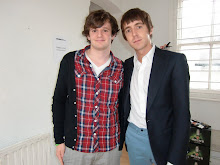
Radiohead’s fourth album, Kid A, was released 10 years ago to a chorus of unsettled critics. After making their major breakthrough with The Bends and their hugely successful third album, Ok Computer, the Oxford five-piece decided to completely change direction. The result of this was yet more success – Kid A went platinum in its first week – but it also alienated many of the fans gained by Ok Computer.
Initially, Kid A sounded like it was produced by an over-excited computer nerd. However, whilst it was difficult to adjust to Radiohead’s new sound at first, eventually Thom Yorke and Co’s new effort weaved its way into ‘classic’ status. The initial bars of ‘Everything In Its Right Place’ proved disconcerting to many, a complete departure from anything that went before.
The title track, a highly processed electronic piece, further emphasised Radiohead’s electronic influences and is a great example of the distortion used on Yorke’s voice throughout Kid A. Everything about this monumental album was different to that which preceded it. The lyrics were not to be found in the album sleeve for the first time since debut album, Pablo Honey, in order to prevent the vocals becoming anything other than another instrument.
Kid A was partly an exercise in anti-commercialism. Thom Yorke was in a similar place as Nirvana front man, Kurt Cobain, after the success of Radiohead’s previous album. Just as Cobain shunned attention towards Nevermind, Yorke tried to shy away from the attention garnered by Ok Computer. Consequently, Radiohead decided not to release any official singles off Kid A, and very little was done to promote it before its release date. Nevertheless, Kid A still became one of the most anticipated albums ever.
Kid A was certainly a big step for a band that had originally played with a three-guitar line-up. In fact, some of the band members struggled at first to adapt to the new sound during recording, feeling uneasy about dropping their signature instruments. However, Kid A isn’t completely bereft of guitars. ‘The National Anthem’ utilizes the bass perfectly, as it reverberates throughout the song intoxicatingly, and continues to do so during the chaotic brass section.
‘How To Disappear Completely’ is also more akin to The Bends material, with its beautiful guitar, string orchestration and Yorke’s existentialist lyrics. Yet, these slightly rockier songs are few and far between on a record that is driven by electronics and synthesized sounds. No song emphasized Radiohead’s change more than ‘Idioteque’, which is formed by electronic beats and apocalyptic lyrics: “Who's in a bunker, who's in a bunker, women and children first.”
With Kid A Radiohead were lucky, they were able to accomplish something that would be nigh on impossible in today’s music industry. The success of Ok Computer allowed them to do what they liked with the follow-up, and the result was this highly-dysfunctional, minimalistic, yet beautiful masterpiece. It is not my favourite Radiohead album – that changes daily – but it really is the album that separated Radiohead from the commercial masses. It is the album that makes anybody who draws any sort of comparison between Radiohead and say, Coldplay, look ridiculously foolish. When placed alongside the rest of Radiohead’s back catalogue, Kid A is like the naughty, disruptive child, the one that fails to do as it’s told. Yet, Kid A, like the child, is loved all the more for it.















0 comments:
Post a Comment